Approach adopted in Wuhan helps contain outbreak
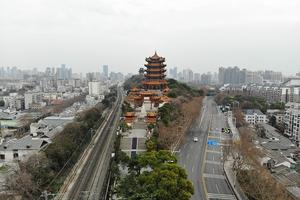 The landmark Huanghelou historical site, also known as the Yellow Crane Tower, stands deserted in Wuhan. (WANG JING / CHINA DAILY)
The landmark Huanghelou historical site, also known as the Yellow Crane Tower, stands deserted in Wuhan. (WANG JING / CHINA DAILY)
Editor's note: Novel coronavirus pneumonia is posing a worldwide threat. Here, we take a look at how China is playing its role in the global fight against the outbreak by mobilizing vast resources to contain the epidemic. This is the second part of a series titled "United Actions".
Ye Qing, who has lived in Wuhan, Hubei province, for more than 40 years, decided to keep a diary to record the unprecedented lockdown placed on the city.
"It was no joke," he wrote on Jan 23, the day the decision to seal off the epicenter of the novel coronavirus pneumonia outbreak was announced and enforced.
Like most of the 9 million people in Wuhan at the time, Ye found out about the lockdown when he woke in the morning because the decision was announced at 2 am. Starting at 10 am that day, services at the city's airport, railway station, ferry ports and long-distance bus stations were suspended. Later, highway entrances and exits were sealed off.
Leading infectious disease expert Zhong Nanshan confirmed on Jan 20 that there was a risk of person-to-person transmission from the virus. However, Ye, deputy head of the Hubei Statistics Bureau, said many locals complained about the sudden decision to introduce the lockdown because they thought the epidemic was not serious enough for such a dramatic measure.
By midnight on Tuesday, of the 80,270 cases in China, 49,540 were from Wuhan. Of the 2,981 deaths, 2,282 were from the city, according to the National Health Commission.
Early cases of infection identified in Wuhan are believed to have acquired infection from a zoonotic source-a disease that can be spread from animals to humans-as many patients had visited or were working at the Huanan Seafood Wholesale Market. As of Feb 25, the animal source had still to be identified.
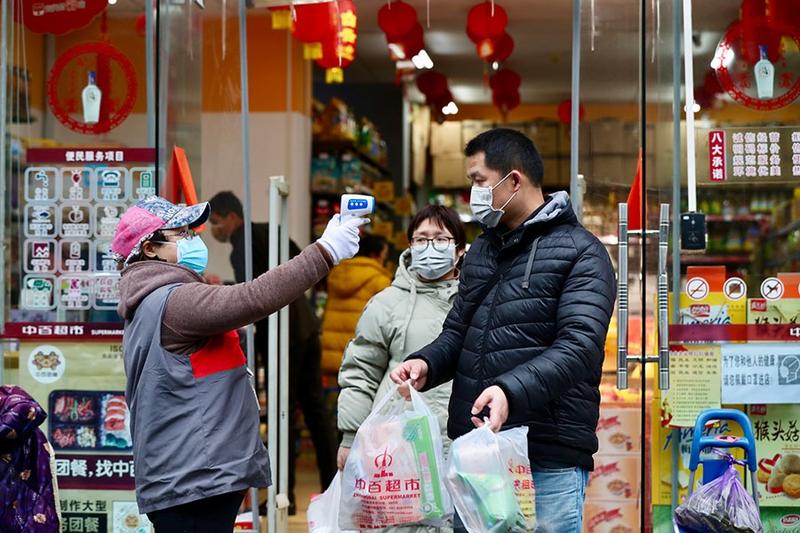 Customers have their temperature checked at a supermarket entrance in Wuhan on Feb 7. (ZHU XINGXIN / CHINA DAILY)
Customers have their temperature checked at a supermarket entrance in Wuhan on Feb 7. (ZHU XINGXIN / CHINA DAILY)
The central government has made it clear that without containing the epidemic in Wuhan and Hubei, it cannot win the war against the virus.
"Now, many people in Wuhan are saying they wish the lockdown could have been introduced earlier, as this has turned out to be an unprecedentedly serious public health incident since the founding of the People's Republic of China in 1949," Ye said.
Wuhan, which has a population of 14 million, is a key land and water transportation hub in central China. Before the lockdown was imposed, some 5 million people had left the city for Spring Festival, which fell on Jan 25.
The World Health Organization-China Joint Mission's report on coronavirus disease said that due to such population movement, the number of people infected spread quickly throughout the country, with cases particularly concentrated in cities with the highest volume of traffic with Wuhan. Some of these generated limited human-to-human transmission chains at their destinations.
To effectively reduce sources of infection, the central government took the landmark decision to lock down Wuhan.
Faced with the threat from the virus, the country has rolled out arguably the most ambitious and aggressive disease containment effort in history. The WHO-China Joint Mission's report said this bold approach to contain the spread of a new respiratory pathogen has changed the course of a rapidly escalating and deadly epidemic.
Ding Xiangyang, deputy secretary-general of the State Council, China's Cabinet, said during a news conference on Feb 20, "Making the call to put Wuhan under lockdown wasn't an easy decision." Ding is also a member of the work group sent by the central government to guide epidemic control work in Hubei, particularly in Wuhan.
He said that despite misunderstandings and controversies during the initial period of the lockdown, it has proved effective in stamping out the spread of the virus in the epicenter. "This move has protected the rest of China and the world," Ding said.
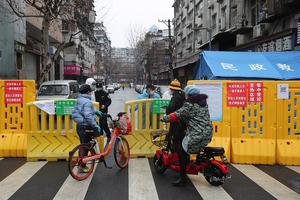 Residents use special passes to enter their community. (WANG JING / CHINA DAILY)
Residents use special passes to enter their community. (WANG JING / CHINA DAILY)
Hotline opened
The lockdown had an immediate effect on life in Wuhan. On Jan 26, Ye wrote in his diary, "After buses and private cars were banned from the streets to minimize movement of people, the bustling city became quiet while the war against the novel coronavirus outbreak intensified."
Xiao Jinsong, a senior psychologist at Zhongnan Hospital of Wuhan University and president of the Hubei Psychologists' Association, said people felt worried and helpless because they had no idea about what was going to happen, as the lockdown was new to everyone, including the authorities.
On the first day of the lockdown, the association opened a hotline to provide free consultations to people in Wuhan
"As the number of cases soared, many people were uncertain whether they could get help if they became infected, due to a severe shortage of hospital beds. Some patients confirmed with the disease who could not get treatment called us after having suicidal thoughts," Xiao said.
Gong Yili, an associate professor at Wuhan University, said the lockdown is the best way to protect everyone in China.
After it was imposed, the 43-year-old said she found it difficult to obtain face masks and some groceries as people stocked up on daily essentials. She also felt sad when she saw on social media that doctors were struggling to treat patients who flocked to hospitals. She said she felt like a "bystander", until the virus hit her family.
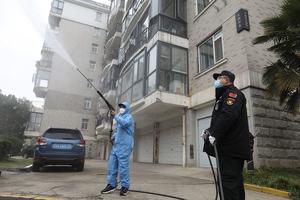 A worker disinfects a neighborhood in Wuhan. (ZHU XINGXIN / CHINA DAILY)
A worker disinfects a neighborhood in Wuhan. (ZHU XINGXIN / CHINA DAILY)
On Jan 26, Yan Bin, Gong's husband, started to develop a cough and fever. Suspecting that he might have novel coronavirus pneumonia, the family implemented quarantine measures at home. Gong knew it could take some time for Yan to be tested for the virus, as medical resources were overstretched.
"We knew we had to remain calm while trying our best to protect our child and parents living in the apartment," she said.
Her husband planned a route to visit the bathroom from the room where he had isolated himself, telling Gong about the areas he had touched, which she then disinfected.
On Feb 3, it was confirmed that he had the virus and he was moved to an isolation facility at a hotel, before being hospitalized after his condition deteriorated on Feb 11.
However, with help from doctors and nurses, his condition rapidly improved and he was discharged from hospital on Feb 26. After remaining in an isolation facility for 14 days, he will be able to return home. No one else in the family was infected.
Gong said, "The epidemic and lockdown has made me feel deeply connected with Wuhan. I've never felt this way before. Even hearing people swearing in the city dialect makes me feel warm."
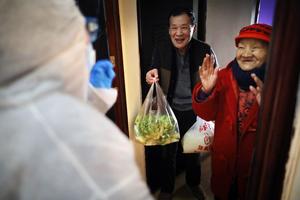 Vegetables are received from community workers by people in quarantine. (ZHU XINGXIN / CHINA DAILY)
Vegetables are received from community workers by people in quarantine. (ZHU XINGXIN / CHINA DAILY)
Although Wuhan has been isolated, people and organizations nationwide have been sending supplies to the city. These include mutton from the Inner Mongolia autonomous region, apples from Shaanxi province and hotpot seasoning from Sichuan province. These voluntary contributions have been made to ensure people in Wuhan are able to enjoy good meals at a time when many agricultural and commercial activities are suspended.
More hospital beds subsequently became available and medical teams from around the country arrived in Wuhan to help.
On Feb 11, stricter measures were imposed in the city, with all housing estates sealed off to outsiders, and only residents holding passes allowed to enter or leave. Groceries can only be delivered to residents on request by a designated person.
On Feb 14, Ye, from the Hubei Statistics Bureau, wrote in his diary: "It is as if we must turn off a running tap so we can clean up water that's already been spilled on the floor. If we cannot minimize the number of new infections, it will be difficult to end the epidemic, no matter how much effort the medical workers have put in. Such measures should be introduced sooner, rather than later. I hope this can be a valuable lesson for the authorities in the future."
Xiao, the psychologist, said that after seeing that the epidemic control measures had taken effect and patients had received proper treatment, people in Wuhan felt a "sense of relief and reassurance".
"They no longer called us about concerns over the virus and treatment. Instead, they began to worry about their jobs," Xiao said. "Many people have received less or no income due to the lockdown, especially those from low-income families. It's a big problem."
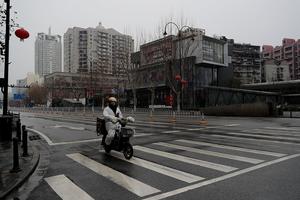 A delivery rider drives along an empty street in the city. (WANG JING / CHINA DAILY)
A delivery rider drives along an empty street in the city. (WANG JING / CHINA DAILY)
Stronger family bonds
Yan Kuo, who works for a Chinese high-tech company in Russia, said he cannot wait to return to the country from Wuhan to ensure that new projects are carried out smoothly. The 41-year-old is working online until after midnight due to the time difference between the two countries.
"I didn't expect the lockdown to last so long, but it's understandable," said Yan, who joined his wife and two children in Wuhan for Spring Festival. "On the other hand, faced with the epidemic, the bonds among our family members have become stronger than ever. I think many Wuhan families feel the same way. "
Xiao warned that after the situation stabilizes, cases of psychological trauma are likely to emerge, especially for those who have lost loved ones.
In many cases, more than one member of a household died from the virus as families gathered for Spring Festival. As a result, those who survived may be wondering why they lost their loved ones. For people who lost family members but were unable to be with them when they died, because of the lockdown, the trauma could be even more severe, Xiao said.
"People in Wuhan might complain about the inconvenience caused by the lockdown, but everyone I've talked to supports the decision and has been following the government's instructions. I hope China can be proud of Wuhan people, who are fighters, too."
The WHO-China Joint Mission report said that on an individual level, the Chinese people had reacted to the outbreak with "courage and conviction", accepting and adhering to the "starkest of containment measures". However, curbing the outbreak has come at a great cost and sacrifice by the country and its people, in both human and material terms.
In an address to reporters and public health officials in Beijing on Feb 24, Bruce Aylward, a top Canadian epidemiologist who headed the Joint Mission and visited Wuhan, said, "To the people of Wuhan, it is recognized that the world is in your debt."
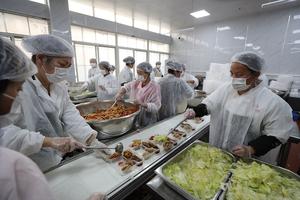 Restaurant workers prepare food for medical professionals and patients at two temporary hospitals in Wuhan, Hubei province. (WANG JING / CHINA DAILY)
Restaurant workers prepare food for medical professionals and patients at two temporary hospitals in Wuhan, Hubei province. (WANG JING / CHINA DAILY)
He added: "The city of skyscrapers, giant auto routes and a gorgeous hypermodern train station was silent. It was a ghost town. And behind every window of these skyscrapers we drove past, there were people. There were people staying put in one place for weeks at a time to stop this disease.
"And if we spoke with people we were working with in Wuhan, they said: 'This is our duty. We have to protect the world from this disease. This is our role. We are playing our role'."
Aylward said these "old-fashioned" measures, coupled with the meticulous tracking of close contacts of infected people and the mass quarantining of all those confirmed with and suspected to have the disease, potentially prevented hundreds of thousands of cases and changed the course of what was a rapidly escalating epidemic.
He said that when the outbreak ends, hopefully there will be a chance to thank the people of Wuhan for the role they have played.
Many people in Wuhan have taken to social media to post items about what they want to do when the outbreak ends. Activities include eating a bowl of the city's famed spicy noodles at a small restaurant hidden deep in an alleyway and talking loudly without wearing a face mask while having a drink with friends.
However, Gong, whose husband became infected, said: "There is nothing special I want to do when the lockdown is over. Living a normal life, such as being able to buy a cake that my son likes from the bakery, is already a luxury."
Ye also wrote in his diary: "Wuhan people will surely celebrate that day in their own ways because they will have won the battle against the novel coronavirus together despite all the difficulties. I will call it V-Day."
Wang Xiaoyu contributed to this story.
Contact the writers at cuijia@chinadaily.com.cn


